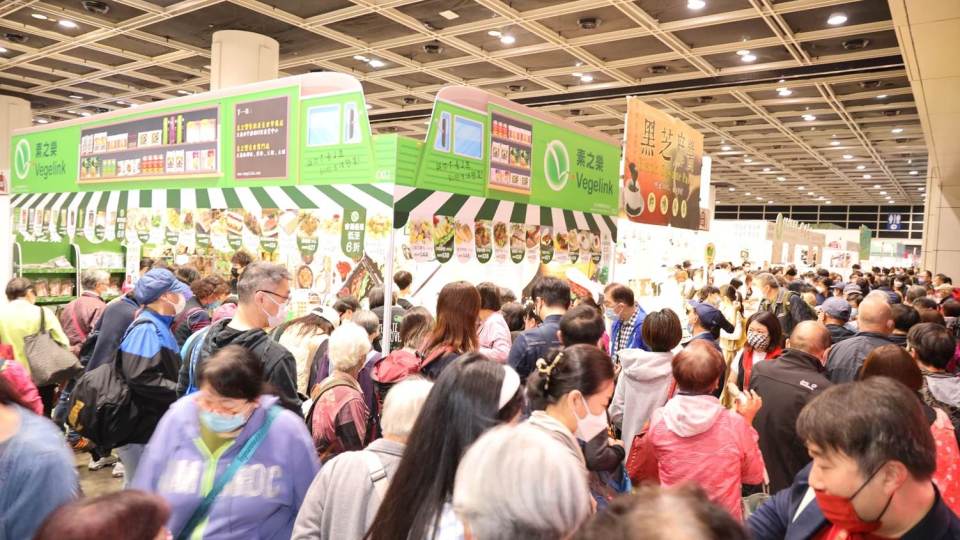
Orange News: A Hong Kong food expo hosts a weekend of green food and activities to celebrate its 10th anniversary, with aims to encourage sustainability.
Vegetarian Food Asia, the expo, marks its 10th anniversary at the Hong Kong Convention and Exhibition Centre, offering 6,000 vegetarian options and green living products. With over 300 exhibitors and 600 brands, there will be taste-testing booths, yoga sessions, and craft workshops from March 8 to 10.
“(The expo is) a good idea actually, this is a very good opportunity to build up awareness because Hong Kong is one of the top beef or meat consumption cities in the world,” said Lawrence Iu, Executive Director of Civic Exchange.
According to a 2020 report, the number of beef exports to Hong Kong was placed at top, averaging US$789 million (HKD$6 billion).
Dr. Ying Ying Liu, Founder and Executive Director of LumiVoce, agreed the expo will be a fantastic medium to promote green living. “That is both positive and also inspiring, because we cannot just (preach it),” she said.
Liu cut down her meat intake by going 95% meat-free. “Animal agriculture is one of the largest contributing factors to climate change and to biodiversity degradation,” she said. “We all need to be very mindful of what we eat.”
“The food cycle is very inefficient so we grow food to feed the livestock, and then we eat the animals,” she added. “In Hong Kong, we eat three to five times the global average seafood. We consume way too much seafood.”
To Iu, it is not a difficult task for the public to go green. “In the Chinese diet, we already have a lot of options like tofu or vegetarian food,” he said. “The misstep is how to encourage people (…) to prioritise this kind of option.”
“In Hong Kong, we only talk about the production side for our (carbon) emissions. Actually, our consumption side estimation is two to three times more,” he added.
There is much to be done in eliminating carbon emissions, Iu suggested the need for cooperation between Hong Kong and the Greater Bay Area. “In Singapore, they already have a target (of) 30 % of the food by 2030 produced locally,” he said. “The Hong Kong government should work closer with the Greater Bay Area (…) and then reduce the reliance on foreign countries.”
“If the Hong Kong government can roll out some incentive or some policy to encourage people to think more green, that will help to change people’s lifestyles,” he added.
Anushka Purohit, founder of Breer, a sustainable drink brand, believed the Government should regulate excess food too. “If the government mandated donating excess,” she said. “A lot of that would have a better outcome. And for businesses like mine, you would be able to have an easier source of collecting that need.”
The brand collects food waste to create beer, but Purohit saves more than Mediterranean toast and dark rye bread. “We also collect pineapple buns for a while. I was looking to collect more different kinds of Hong Kong iconic bread, but beyond bread, sometimes we also create beers (with) egg tarts and egg waffles,” she said.
Since 2020, Breer has saved over 12,000 kg of bread and 20 kg of other food items. Purohit found the amount of food waste jarring. “As a city, Hong Kong dumps around 3,353 tons of food and of that a significant 47% is just bread,” she said.
“Sustainability is never really about sacrifice. It’s about finding options that make it easy for you to make the world a better place,” she added.
Lucia Loposova, Executive Director of Green Hospitality, looked for solutions to food waste. “If there is a lot of food waste, for instance, (…) what can we do to reduce this? Not only simply send it to recycling, but what can be reduced. Because ultimately, we are looking at reduction of initial resources to make the city more circular,” she said.
“We believe that businesses have a lot of power to influence the consumers,” she added.
In 2021, the Government announced Hong Kong’s Climate Action Plan 2050, outlining decarbonisation strategies to lead the city into carbon neutrality.
However, to push this agenda further, Liu believed we have to start educating children. “We really need to educate the young,” she said. “Because when they create, when they learn, when they explore, create wildlife art, they learn about our ecosystem.”
Stamp making with plastic and chocolate painting are some of the expo activities that welcome family and friends to learn about sustainability through art building.
Originally published on Orange News on 8 Mar 2024.